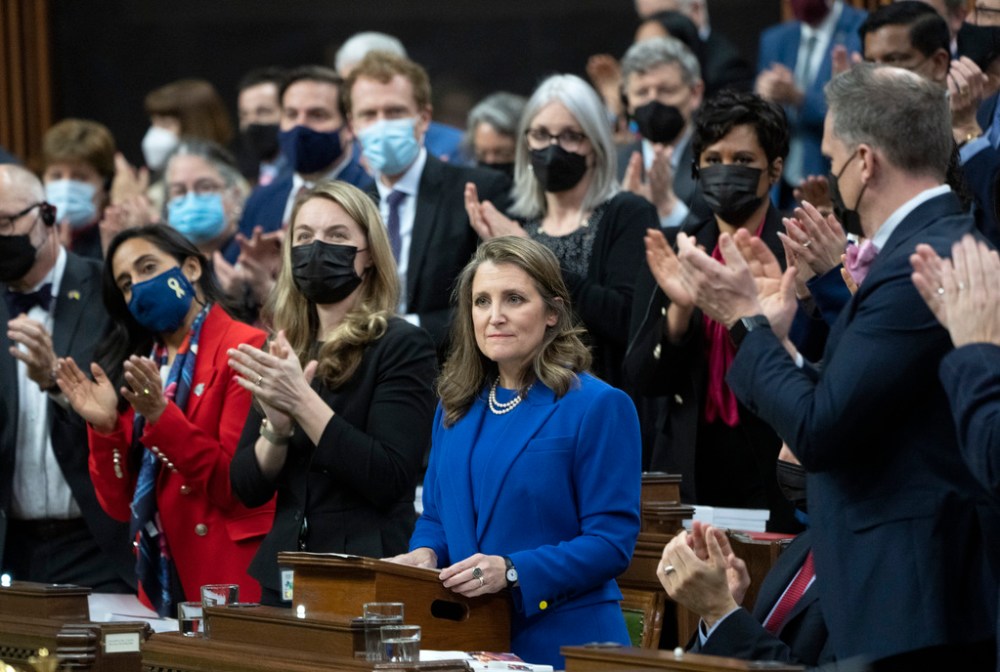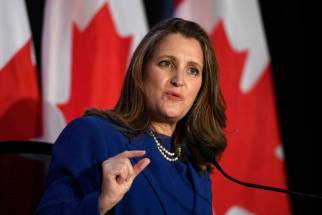Liberals too comfortable with deficit spending
Read this article for free:
or
Already have an account? Log in here »
To continue reading, please subscribe:
Monthly Digital Subscription
$0 for the first 4 weeks*
- Enjoy unlimited reading on winnipegfreepress.com
- Read the E-Edition, our digital replica newspaper
- Access News Break, our award-winning app
- Play interactive puzzles
*No charge for 4 weeks then price increases to the regular rate of $19.00 plus GST every four weeks. Offer available to new and qualified returning subscribers only. Cancel any time.
Monthly Digital Subscription
$4.75/week*
- Enjoy unlimited reading on winnipegfreepress.com
- Read the E-Edition, our digital replica newspaper
- Access News Break, our award-winning app
- Play interactive puzzles
*Billed as $19 plus GST every four weeks. Cancel any time.
To continue reading, please subscribe:
Add Free Press access to your Brandon Sun subscription for only an additional
$1 for the first 4 weeks*
*Your next subscription payment will increase by $1.00 and you will be charged $16.99 plus GST for four weeks. After four weeks, your payment will increase to $23.99 plus GST every four weeks.
Read unlimited articles for free today:
or
Already have an account? Log in here »
Hey there, time traveller!
This article was published 08/04/2022 (1339 days ago), so information in it may no longer be current.
The objective of responsible budget-making in government is to balance the wants and needs of society with the means to pay for them.
That is never an easy task, especially during economic downturns or when crises hit, such as the COVID-19 pandemic. There are times when it is prudent for government to borrow in order to maintain critical services, or to prevent the economy from falling into a tailspin. It is equally desirable for governments to live within their means during periods of economic growth, including paying down debt to prepare for the next downturn in the business cycle.
The federal budget unveiled Thursday by Minister of Finance Chrystia Freeland does not match expenditures with revenues. Government plans to spend $52.8 billion more than it is taking in from taxes, fees and other revenues. That is a far cry from the $327.7-billion deficit posted in 2020-21 during the height of the pandemic, when government rightly provided businesses, individuals and other levels of government with time-limited fiscal support during a crisis.

But as those supports wind down, government should be finding ways to return to balance, especially with the economy performing better than expected, and as unemployment continues to fall (it dropped to 5.3 per cent in March, its lowest level since 1976).
Instead of living within its means, the Liberal government has carved out a path of deficit financing for the next five years. Deficits are projected to decline in each of those years, dropping to $8.4 billion by 2026-27. However, given the Liberal government’s track record of falling short of its deficit targets since coming into office in 2015 – including during the years prior to the pandemic – there are no assurances those projections will be met.
Prime Minister Justin Trudeau’s government has not balanced the books in seven years, and is now planning at least another five years of deficits. That should be of concern to Canadians.
The 2022 budget includes some new and laudable spending initiatives, including a national dental program that, when fully rolled out, will provide low-income seniors and Canadians under the age of 18 with much-needed dental coverage. There is more money for the provinces, including for health care, higher spending to fight climate change, and a long-overdue infusion of cash into the country’s defence budget.
“Canadians deserve a more responsible approach to federal budget-making than what they witnessed this week.”
However, a large proportion of those new expenditures are offset by significant revenue increases (in large part fueled by higher inflation) and a sharp decline in employment insurance payouts over the next several years.
Barring unforeseen circumstances, there is no reason – given current economic projections – for government to plan for deficit budgets over five years. Chronic deficits weaken government’s balance sheet and undermine its ability to prepare for future economic downturns. This year’s heavy spending — about 25 per cent higher than pre-pandemic levels — is also expected to put upward pressure on inflation.
Even under the department of finance’s most optimistic projections, the federal government is not expected to bring its debt-to-GDP ratio back to pre-pandemic levels until 2040, a long-term projection fraught with uncertainty. Those projections do not include the risks associated with future recessions or pandemics, or the effects of climate change.
As was the case under previous Liberal spending plans, the 2022 budget attempts to normalize deficit spending. It has lowered the bar on fiscal prudence. There are dangers associated with that approach, including the risk of being ill-prepared for the next fiscal crisis.
Canadians deserve a more responsible approach to federal budget-making than what they witnessed this week.



















